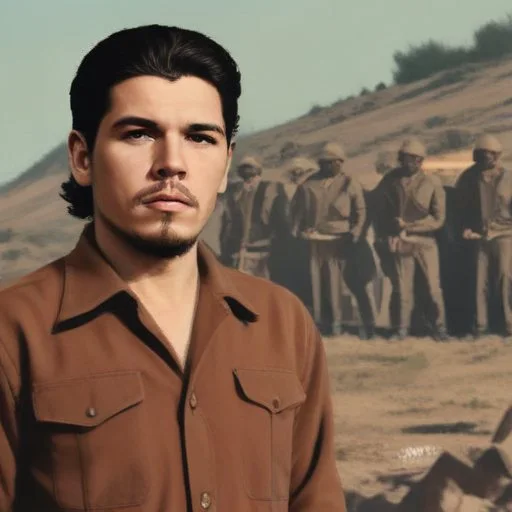The world was left reeling on October 9, 1967, as news spread of the execution of Ernesto Che Guevara, the charismatic Marxist revolutionary who had captivated the hearts of many with his vision of a socialist utopia. Just a day prior, Guevara had been captured by Bolivian soldiers, marking the end of his audacious attempt to spark a revolution in the Latin American nation.
In the aftermath of the Cuban Revolution, Guevara's reputation as a revolutionary leader had grown significantly. However, he soon became disillusioned with the Cuban government's drift towards Soviet-style socialism and began to seek new ventures. Bolivia, with its rich natural resources and repressive government, presented the perfect opportunity for Guevara to put his revolutionary ideology into practice.
On October 8, 1967, Guevara's guerrilla group, comprising Cuban and Bolivian rebels, was ambushed by Bolivian soldiers in the Quebrada del Yuro valley. Despite being vastly outnumbered, Guevara fought valiantly, but was eventually wounded and captured. As he was taken away, he defiantly declared, "I am Che Guevara, and I will return, and I will be millions."
The following day, in a dingy schoolhouse in the village of La Higuera, Guevara was executed by a firing squad. The execution was carried out despite international pleas for clemency, with many world leaders, including Fidel Castro, urging the Bolivian government to spare Guevara's life. The cold-blooded killing of the charismatic revolutionary sent shockwaves across the globe, cementing his legendary status as a champion of the people and a symbol of resistance against oppressive regimes.
Guevara's execution and subsequent legend have sparked intense debates about the merits of his ideology and actions. Critics have lambasted his authoritarianism and support for violent revolution, while admirers have hailed him as a champion of social justice and human rights. Regardless, the enigmatic figure of Che Guevara continues to captivate and inspire, serving as a powerful symbol of resistance against the status quo.
The execution of Ernesto Che Guevara on October 9, 1967, marked a turning point in modern history, galvanizing social movements and inspiring generations of activists. As the world continues to grapple with the complexities of inequality, poverty, and oppression, the legend of Che Guevara remains an enduring testament to the power of human conviction and the unyielding pursuit of a better tomorrow.
Ernesto Che Guevara was born on June 14, 1928, in Rosario, Argentina, to a middle-class family. His early life was marked by a strong sense of social justice, which was instilled in him by his parents. As a young man, Guevara embarked on a journey across South America, where he witnessed firsthand the poverty and inequality that plagued the continent.
This experience had a profound impact on Guevara, shaping his worldview and fueling his desire to create change. He eventually settled in Guatemala, where he became involved in the country's socialist movement and met his future wife, Hilda Gadea.

Che Guevara's leadership qualities were evident from the early days of the Cuban Revolution. His fearlessness, intelligence, and passion inspired loyalty and devotion in his comrades. Fidel Castro, the leader of the Cuban Revolution, recognized Guevara's potential and appointed him as the commander of the rebel army.
Guevara's charisma and strategic mind helped the rebels achieve a series of victories against the Batista regime. His legendary status was cemented during the Battle of Santa Clara, where he led a daring raid on a government stronghold, culminating in the regime's collapse.
Che Guevara's image has become an ubiquitous symbol of revolution and resistance. His likeness has been reproduced on countless stickers, posters, and t-shirts, becoming a cultural icon of the 20th century.
The irony of Guevara's image being used to sell products and promote capitalism has not been lost on critics, who argue that his ideals have been watered down by commercialization. Nonetheless, his image continues to inspire and provoke, serving as a powerful reminder of the struggle for social justice.

Che Guevara's disillusionment with the Cuban government's drift towards Soviet-style socialism was rooted in his perception of the latter as bureaucratic and authoritarian. He believed that socialism should be a means to empower the masses, not a tool for state control.
Guevara's critique of Soviet-style socialism was influenced by his experiences in the Soviet Union, where he witnessed firsthand the limitations of the socialist model. This critique led him to seek a more radical and decentralized approach to socialism, which ultimately led him to Bolivia.
The news of Che Guevara's execution sent shockwaves across the globe, galvanizing social movements and inspiring a new generation of activists. His martyrdom sparked a wave of protests and demonstrations, from the streets of Paris to the universities of Mexico City.
The execution of Guevara also fueled the growth of the New Left movement, which sought to challenge the traditional socialist and communist parties. His ideas about decentralized socialism and guerrilla warfare influenced a range of social movements, from the anti-war movement in the United States to the anti-colonial struggles in Africa and Asia.